Shocking way Cybertruck bomber meticulously used AI to plan Trump hotel explosion
Cybertruck bomber Matthew Livelsberger used ChatGPT to gather information on how to carry out his plan, police said.
Livelsberger, a former Green Beret and active-duty U.S. Army Ranger, 37, shot himself in the head seconds before an improvised explosive device detonated in the back of his rented car on New Year’s Day outside the Trump International Hotel in Las Vegas.
During a press conference Tuesday, Sheriff Kevin McMahill of the Las Vegas Metropolitan Police Department revealed that Livelsberger used the generative artificial intelligence chatbot to help him “build a certain device” and “plan his attack.”
“Of particular note, we also have clear evidence in this case as the suspect used ChatGPT artificial intelligence to plan his attack,” McMahill said.
‘We know that at some point, in basically our entire lives, AI would change the game for all of us.
“I believe this is the first incident that I am aware of on U.S. soil where ChatGPT is being used to help an individual build a particular device.”
It is unclear what exactly Livelsberger was looking for and what answers he received.
Authorities also said new evidence has emerged that Livelsberger had a six-page manifesto on his cell phone, confirming he died by suicide.
Cybertruck bomber Matthew Livelsberger used Chat GPT to gather information on how to carry out his plan, police say
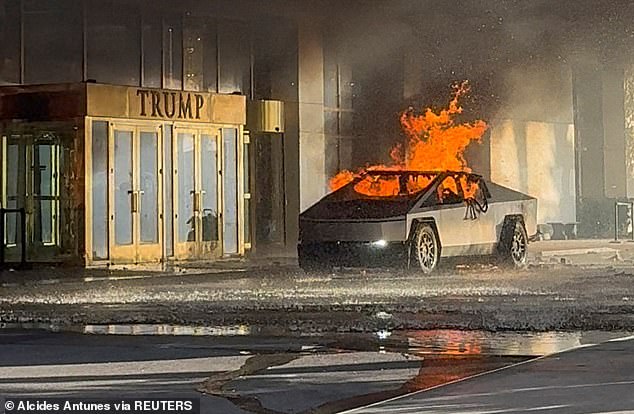
Livelsberger, 37, shot himself in the head seconds before an improvised explosive device detonated in the back of his rented car on New Year’s Day outside the Trump International Hotel in Las Vegas
‘This new information raises more questions than answers. “I will not express an opinion on what the documents mean, nor will we release any information or documents that have not been fully verified,” the sheriff added.
In response to the discovery of ChatGPT helping Livelsberger, OpenAI shared NBC News The company is “saddened” that its technology was used to carry out the attack.
“We are saddened by this incident and would like to see AI tools used responsibly,” the spokesperson said.
‘Our models are designed to reject harmful instructions and minimize harmful content.
“In this case, ChatGPT responded with information that was already publicly available on the Internet warning against harmful or illegal activity,” they continued, adding that the company is cooperating with law enforcement in the investigation.
DailyMail.com contacted OpenAI for comment.
The new manifesto pages come just days after two other notes on his phone made it clear his motive was not terrorism or violence.
He sent the suicide email or suicide manifesto to retired US Army intelligence officer Sam Shoemate shortly before the bombing, which injured seven bystanders.
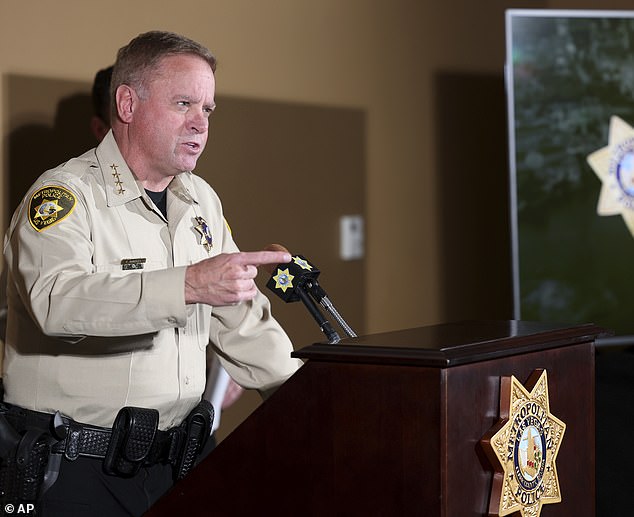
During a press conference Tuesday, Sheriff Kevin McMahill of the Las Vegas Metropolitan Police Department revealed that Livelsberger used the AI chatbot to help him “build a certain device” and “plan his attack”
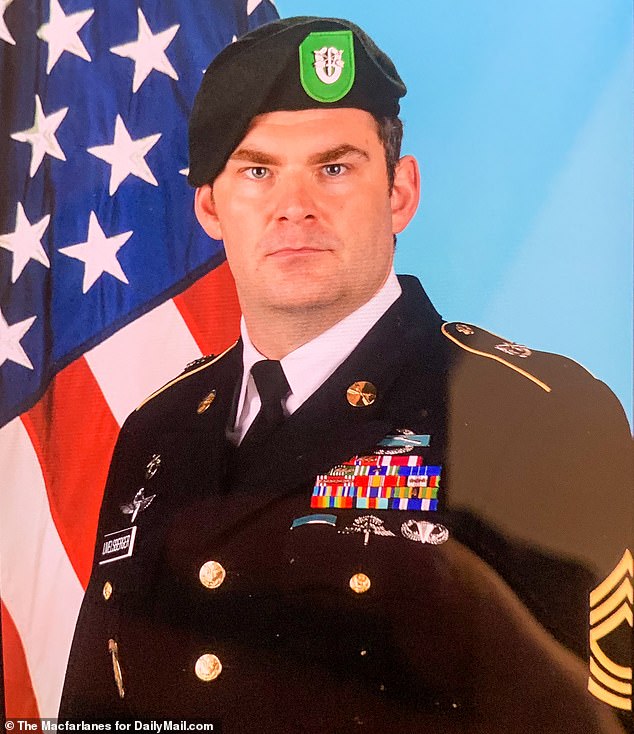
Authorities also said new evidence has emerged that Livelsberger had a six-page manifesto on his cell phone, confirming he died by suicide.
The email claimed that the mysterious drones seen over New Jersey and sometimes other parts of the East Coast were Chinese weapons.
Livelsberger warned that they could be well armed, attack anywhere and pose the “most dangerous threat to national security that has ever existed.”
Investigators were looking into whether the bombing was related to the terrorist attack in New Orleans, or whether it was motivated by Livelsberger’s personal problems.
The FBI said at a news conference Friday afternoon that he acted alone and that his behavior was fueled by PTSD and various personal grievances.
“While this incident is more public and sensational than usual, it ultimately appears to be a tragic case of suicide involving a highly decorated combat veteran struggling with PTSD and other issues,” said Spencer Evans, Special Agent in Charge of the FBI. Las Vegas division, said.
Las Vegas police also shared excerpts from two other writings, recorded in the note-taking app on his phone, that showed the bombing was intended to draw attention to his concerns.
“We (the US) are terminally ill and heading for collapse. This was not a terrorist attack, it was a wake-up call,” the letter said.
‘Americans only pay attention to spectacle and violence; what better way to get my point across than a stunt involving fireworks and explosives.
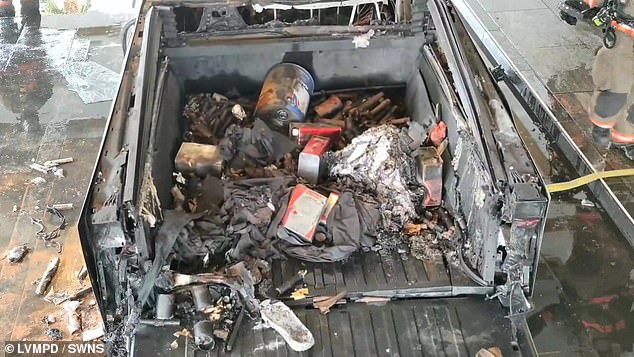
The contents of the Cybertruck’s container, where the bomb was stored and detonated
‘Why did I do it personally now? I must cleanse my mind, the brothers I have lost, and release myself from the burden of the lives I have taken.”
Las Vegas Assistant Sheriff Dori Koren said another letter “mentioned a variety of other grievances and issues, some political, some personal, a variety of other things that we will do our best to release very quickly.”
Some of it told veterans and Americans that it was “time to wake up, we are led by weak and reckless leadership that only serves to enrich themselves.”
Alicia Arritt, Livelsberger’s ex-girlfriend, later revealed that he had experienced paranoia and nightmares for years before his death.
Arrit, who met the veteran on a dating app after divorcing his first wife, said he showed signs of PTSD as early as 2018, when they started dating.
After dating for three years before remarriage, the two lost contact after they broke up, but perhaps in a telling sign, Livelsberger contacted Arritt in the days before his death to show off the rented Tesla Cybertruck.
Now, Arritt has spoken out about Livelsberger’s mental health issues in an attempt to shed light on his state of mind.

Alicia Arritt, Livelsberger’s ex-girlfriend, later revealed that he had experienced paranoia and nightmares for years before his death
“He described the same symptoms as in a textbook,” she said 11 Newsrevealing that she had seen PTSD in veterans in her role as an Army nurse.
‘In 2020 he had paranoia and nightmares. He was exhausted and depressed. He gained weight and could no longer think.’
There are opportunities to get help within the military, but Arritt said there is still a lot of stigma attached to mental health issues, especially in the high-level unit that Livelsberger was a part of.
‘If he was diagnosed with depression or a traumatic brain injury, he would not be employable and he certainly did not want that. He wanted to be there for his guys,” Arritt said.
“The VA has gotten so much better at caring for these veterans, but they’re not treating them on active duty. They just keep them in the war until they’re gone, and the VA takes care of them when they’re gone.”
Police allege that Livelsberger, who was on an approved break from the military, rented the truck in Colorado and drove it across the border into Nevada on New Year’s Day.
Within an hour of arriving in Las Vegas, he had detonated the truck full of improvised explosive devices he had in bed.
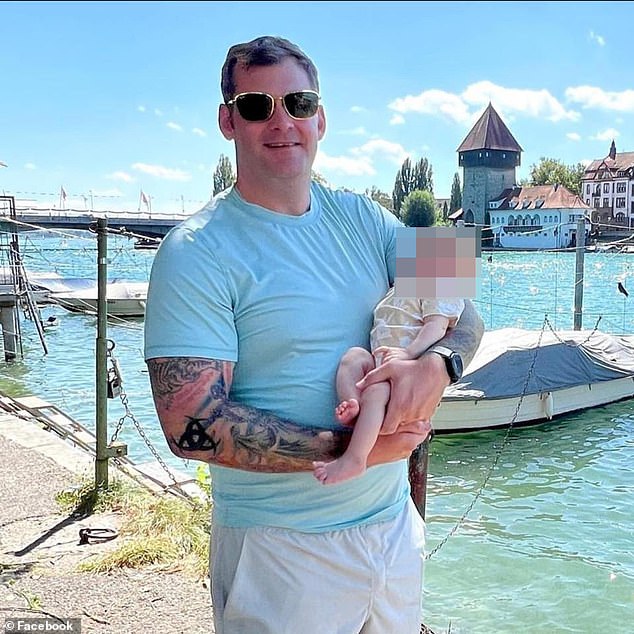
Livelsberger claimed China is stalking the US with advanced drones in an unhinged suicide note
Livelsberger was the only victim of the incident, and police largely credit the hulking stainless steel Tesla truck with saving lives by containing the explosion.
An Army spokesman said soldiers have resources at their disposal to seek help.
“The U.S. Special Operations Command established the Preservation of the Force and Family (POTFF) program, which provides holistic care across physical, cognitive, medical and support resources, tailored to each individual,” the spokesperson said.
“We encourage our Soldiers, if they need help, need mental health treatment or need to talk to someone, to seek proactive behavioral health care either on base or online.
Master Sgt. Matthew Livelsberger had access to and used the POTFF program; he did not exhibit any concerning behavior at the time and was placed on personal leave. All relevant information has been provided to the FBI as the lead investigative agency.”
